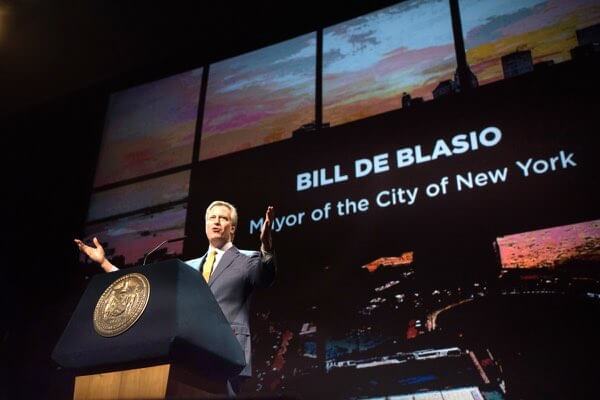By Gina Martinez
Mayor Bill de Blasio outlined his goals for New York City at his fifth State of the City address Tuesday.
The mayor unveiled his 12-point plan to improving the city, which included the expansion of affordable housing, early childhood education programs and better policing.
The address began with de Blasio counting down the three years, 10 months and 15 days left in his term, remarking that it’s the amount of time he has to ensure that New York City becomes the “Fairest Big City in America.” Without mentioning the Trump administration by name, de Blasio said that New York has to be the “antidote to the sickness that is gripping our nation” and promised to keep New York City a sanctuary city for all.
“We do this to preserve the social fabric of the most diverse place on earth,” he said. “We do this to ensure that we’re always a place for everyone, that magical openness that has made New York City great is always protected. But we also do this to guard against the threats to our democracy that are growing across this nation.”
De Blasio attributed better relationships between the community and police as the reason for the decline in crime in the city over the last few years.
“Nothing defines the relationship between a society and its people more than how they are policed,” he said. “If policing is fair it makes fairness possible in all aspects of life, and that’s what we have to insure.”
The city will extend and deepen neighborhood policing, which he says keeps crime low while also keeping arrests low. Police will be held accountable and increase trust in the community by having body cameras on all patrol officers by the end of this year, according to de Blasio.
“The beauty of this approach is it keeps getting better year by year,” he said. “The more we heal the wounds of the past, the deeper the bonds become between police and community and the further we go.”
After the success of pre-K for all, de Blasio said he has his eye on a 3k for All program that will give all 3-year-olds free education. He added that extending early childhood education programs to all neighborhoods will shorten the achievement gaps that affect the city’s poorest neighborhoods, which are usually made up of minority children.
“We know exactly where the problem comes from, but to defeat structural racism and to overcome this achievement gap, we have to flip the script,” he said. “We have to do something different when it comes to education because, in truth, we started educating children too late in their development and that exacerbate equalities already baked into their lives at an early age.” De Blasio said by 2021 all 3-year-olds will have access to childhood education.
The mayor then moved on to affordable housing. Last week, he unveiled his new plan for affordable housing in Willets Point that ensured at least 1,100 units in the new development will be affordable.
“In the last few months, the biggest affordable housing plan in the history of New York City got even bigger,” he said. “When it comes to fighting income and inequality and creating fairness in our everyday lives, nothing is more important than affordable housing. It’s not just that this is the number one expense for every family and that the costs of housing defines whether you can live a decent life or not in this city. It’s also about a basic question of fairness. Will the people who built this city, the people who were here in good times and bad, will they get to stay in the city they love?”
He said he will continue to fight so that families are protected from illegal evictions as well as building more building with affordable units.
De Blasio ended his address by encouraging New Yorkers to vote in the November elections.
“This November you will get a chance to vote for reforms that get big money out and grassroots democracy in,” he said. “It will help to make sure that we can get you involved in so many ways that will strengthen the democracy of our city and the involvement of our people.”
Reach Gina Martinez by e-mail at gmart



































